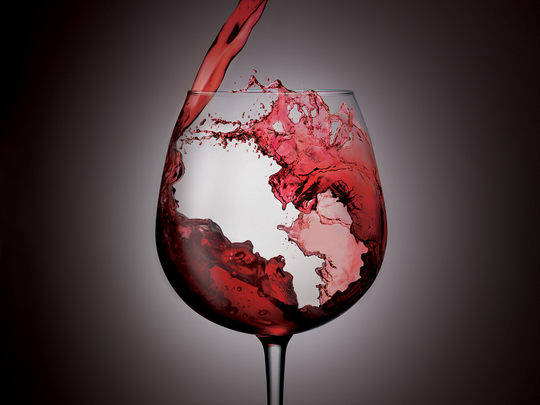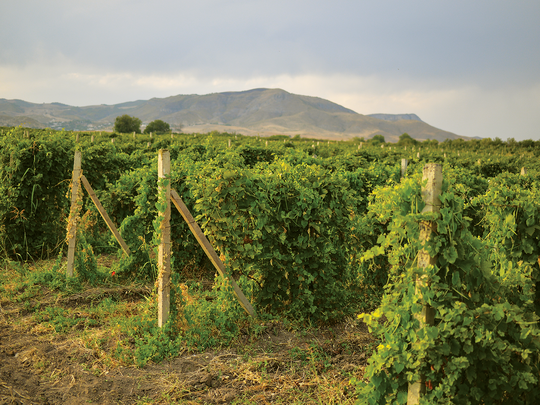Intrigued that wine originated in the Caucasus, Swiss winemaker Jakob Schuler, whose family owns boutique wineries in Tuscany and the Canton of Valais in Switzerland, tried to convince his team to start a new venture in the region. They didn’t seem to be interested. In 2012, Schuler decided to explore on his own to see what the land had to offer. The first stop was Georgia to learn more about its famous grape variety Saperavi. Not quite convinced, he took an unexpected side trip to Armenia and stumbled onto Areni. The rest is history.
Today, Jakob Schuler produces NOA–Noah of Areni, using indigenous grape varieties while watching his business grow. In response to our question about the one thing about his experience that he would like people to know, Schuler replied, “I just want to emphasize that I am very happy to have started this very interesting venture/adventure in Armenia.”
The following is the full interview with this master winemaker from abroad who fell in love with wine country in Armenia.
Q. What inspired you to start a winery in Armenia?
A. As a winemaker, I knew that wine had its origins in the Caucuses and that interested me greatly. In 2012, I traveled to Georgia but was disappointed by its autochthone grape variety Saperavi. Then someone mentioned Armenia and I decided to investigate. Yet I was disappointed once again with the big modern wineries that made Cabernet-Sauvignon, Merlot, etc. To me, it was just more of the same as every other wine industry in the world. It was only during the last two days of my visit that I discovered the very fascinating autochthone grape varieties Areni and Voskehat. I was amazed and knew I had found what I had been searching for.
Q. Where is your winery located and what kind of wine do you make?
A. We produced our first two vintages in cooperation with an existing winery in the Areni Valley. They produced Areni wine for us, following our instructions to prune the vines more aggressively and delay the harvest. It worked out well, but I felt that there was even more potential. We decided to purchase vineyards to better control the entire production from pruning to harvest. This vinification is conducted in cooperation with a partner for whom we financed some of the cellar equipment. The fermentation and edification of the young wine are there and our partner Arman, a very good winemaker, oversees the process.
We don’t have our own cellars yet, but it’s what we have planned for 2021. Until then, we will continue developing and improving our vineyards. Our goal is not to create as large a winery as Karas or Armenia Wine. Instead, we will always be a niche player with very special products of the highest quality. We have 50 hectares of vineyards and 30 hectares of nude land on which we want to plant more vines. Our vineyards are in Rind and Aghavnadzor [in the Vayots Dzor region]. We have been producing NOA Red Classic and Red Reserve since 2017 and NOA White since 2018, as well as a few bottles of Rosé.

Q. What makes Armenia unique and appealing to foreign winemakers?
A. I believe Areni is the oldest grape variety. Our vineyards in Armenia are 1,200-1,500 m above sea level with very high day temperatures and cool nights, allowing berries to ripen with a unique aroma. We can make wine in Armenia that we cannot make anywhere else. This opportunity to cultivate something exquisite is very appealing.
Q. What were the initial challenges as well as the opportunities for establishing a vineyard in Armenia?
A. This project in Armenia was challenging in every possible way. Yet it was also extremely satisfying. We worked with good people who were eager to learn and work hard to achieve our goals.
Q. What is your overall vision for your brand?
A. We do not want to become the biggest, we don’t even want to be big. However, we do try to be the “Best in Class.”
Q. What are your measures for success?
A. When the customer comes back for more. That’s what we consider success. The first time a customer orders a bottle of our wine in a restaurant or at a wine shop may be out of curiosity. When they buy it again, it shows that we have succeeded. Repeat business is critical for us.
Q. What differentiates you from your competitors in Armenia and elsewhere?
A. Maybe that NOA–Noah Wines are the first Armenian wines produced by a non-Armenian. We do many things differently, such as producing barriques with different sorts of woods that are tailor-made to the different origins and varieties of grapes and we run Vinalytic, quality control, and a research center. Although these are rather difficult things to do, we believe they will allow us to realize our full potential.
Q. What is your marketing strategy?
A. We all work and live for our customers. Satisfying or even fascinating our customers is our goal. The rest will follow.
Q. What does Armenia need to do to put its wine on the world wine map?
A. Armenia is on the right track. Only a few years ago Armenia produced only sweet, semi-sweet and aromatized wines mainly for the Russian market at cheap prices. Today the country is going to great lengths to achieve the desired varieties and terroir. Compared to the big wine producers in the world, Armenia is a small wine country. The only chance for it to succeed is to focus on the quality of its wines. Leave the mass production at low prices to Chile, Australia, and others.
Q. Do you envision a time when Armenia will join the ranks of other locations that are universally famous for wines?
A. Absolutely. The potential exists and many young, ambitious winemakers are working toward this objective.
Q. Do you have any new wines that are ready to go to market?
A. Unfortunately, our wines are not sold in Armenia. As of today, all our wines have been exported, sold and served in Switzerland and Germany. The 2017 vintage will be the first to be sold also in Armenia, China, and Russia. This wine is still aging in the barriques and has not yet been bottled.

Q. What is your personal favorite wine in the world and why?
A. The world of wine is so fascinating that it would be wrong to designate a favorite. I have many preferences. However, since I am closely involved with Armenia, NOA is certainly one of my favorites.

Banner photo by Remo Inderbitzin











